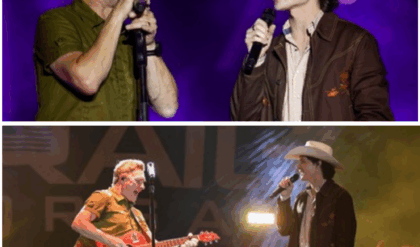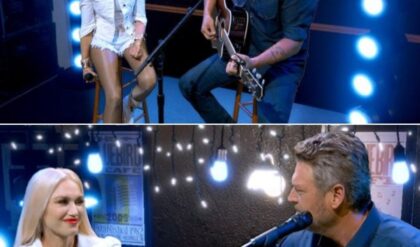In the misty labyrinth of Louisiana’s bayous, where cypress knees pierce the water like forgotten prayers and the air hums with the chorus of bullfrogs and distant accordions, music has always been more than melody—it’s survival, solace, and a stubborn thread tying the living to the lost. Dustin Dale Gaspard, a 33-year-old troubadour from the speck of a town called Cow Island in Vermilion Parish, embodies this raw poetry. On October 6, 2025, during the Blind Auditions of NBC’s The Voice Season 28, Gaspard stepped into the national glare not as a polished performer, but as a vessel for the soul-stirring “swamp pup music” he calls his own—a gritty fusion of Cajun rhythms, New Orleans blues, country twang, and the bilingual lilt of his Acadian ancestors. Strumming a weathered acoustic guitar and blowing soulful riffs on a harmonica slung around his neck, he transformed Sam Cooke’s timeless “Bring It On Home to Me” into something achingly personal, slipping seamlessly from English croon to Cajun French verses that evoked the ghosts of grandfathers long gone. The result? A historic four-chair turn, the first time the show’s coaches had ever heard Cajun French waft through the studio. Reba McEntire, Niall Horan, Snoop Dogg, and Michael Bublé spun around in unison, their faces alight with the shock of discovery. “You’re different, you’re unusual, you’re refreshing,” McEntire marveled, her Oklahoma drawl laced with kinship. Horan, sealing the deal with his third-season charisma, called it “one of the best auditions I’ve seen… a proper, unique, full-of-character voice.” Gaspard chose Team Niall, but the real story unfolding behind those notes was one of profound loss and improbable redemption—a tale that has left America wiping tears and rooting for the underdog from the edge of the world.
Gaspard’s performance wasn’t just a showcase of vocal chops; it was a quiet elegy, a final whisper to a love silenced too soon. In a post-audition interview with local Acadiana outlet News 15, the soft-spoken singer, his eyes shadowed by the brim of a faded trucker hat, revealed the devastating truth behind his song choice. “That was the last song I sang to her,” he said, voice cracking like Spanish moss in a storm. “Bring It On Home to Me”—the plea for reunion, the promise of return—was the very tune he strummed at her bedside in the dim glow of a hospice room, her hand frail in his as the monitors beeped their merciless countdown. She was his beloved, a woman whose name he guards like a sacred chord, lost to a sudden illness that stole her away just months before his Voice audition. Friends describe her as the quiet force behind his music, the one who mended his strings during late-night jam sessions in their shotgun shack on the bayou’s fringe, her laughter mingling with the call of herons at dawn. “She was my home,” Gaspard confided to a Lafayette radio host days after the episode aired, “and singing that felt like bringing her back, even if just for three minutes.” The coaches, oblivious during the blind spin, later learned the story in rehearsals; Horan, moved to hug him onstage, dubbed it “the gutsiest, most genuine art I’ve coached.” Fans flooded social media with #SwampHeartbreak, sharing stories of lost loves and vowing to stream his originals until the charts weep.
This layer of heartbreak transforms Gaspard’s Voice arc from mere competition fodder to a narrative of cathartic resurrection. Born March 3, 1992, in the rural whispers of Cow Island—a community so small it boasts more alligators than stoplights, where “swamp puppies” (as he endearingly calls the gators) outnumber residents—Dustin grew up steeped in the cultural gumbo of South Louisiana. His childhood unfolded amid the cane fields and marshlands of Vermilion Parish, a landscape of ancient live oaks draped in resurrection fern and waterways that twist like the veins of forgotten ancestors. Music seeped into his bones early: family fais-do-dos where accordions wailed and fiddles danced, the crackle of zydeco on AM radios, and the soulful swamp pop of icons like Rockin’ Sidney and the Neville Brothers blasting from his father’s rusted pickup. “My grandpère would play banjo on the porch till the lightning bugs came out,” Gaspard recalls in his bio on dustingaspardmusic.com, “telling tales of the Grand Dérangement—the Acadian exile—in songs half English, half French.” That bilingual heritage, a defiant echo of the 1755 British expulsion of French settlers from Nova Scotia, became Gaspard’s sonic signature. By high school in nearby Abbeville, he was scribbling lyrics in spiral notebooks, blending folk introspection with bluesy grit, his voice—a warm, weathered baritone with a hint of gravel—already hinting at the depths it would plumb.
But the road to The Voice was no straight shot down the bayou; it was a serpentine path pocked with detours through despair’s deepest sloughs. After graduating, Gaspard dove headfirst into the indie circuit, fronting DG and the Freetown Sound, a high-octane sextet fusing soul, blues, rock, and Cajun fire. They gigged relentlessly across the Deep South—from smoke-filled Baton Rouge honky-tonks to New Orleans’ French Quarter dives—building a grassroots buzz that led to his solo debut album, Hoping Heaven Got a Kitchen, released in March 2022. The record, a banjo-driven bilingual odyssey chronicling Acadian exile and personal reckonings, drew raves from Americana outposts like the Oxford American: “Gaspard’s songs feel like dispatches from a submerged world, equal parts lament and levee dance.” Tracks like “Take Me With You” and “J’ai Beaucoup d’Espoir” (I Have a Lot of Hope) showcased his multi-instrumental prowess—guitar, banjo, tambourine, harmonica—and his knack for cryptic lyricism that peels back like an onion, revealing layers of longing and lore. He followed with an EP, In Callow Comfort, and a collaborative tour in spring 2025 with Pennsylvania banjo wizard Tanner Bingaman, logging 10,000 miles through the Pacific Northwest and Canada, their duets blending Appalachian twang with Louisiana lagniappe.
Yet beneath the stage lights lurked shadows that threatened to swallow him whole. Gaspard fronted a nomadic existence, living lean off gig tips and festival hauls, his home a series of borrowed couches and, eventually, the open road. For years, he poured over 100,000 miles onto a converted cargo van dubbed “The Swamp Wagon,” its walls papered with setlists and faded polaroids, a rolling sanctuary for songwriting sessions fueled by black coffee and bayou sunsets. “It was freedom, till it wasn’t,” he told The Advocate in a candid October 9 profile. The van symbolized his hustle but also his unraveling—meals skipped, gigs chased through hurricanes, the isolation of a life measured in exit ramps. Then came “the lowest point,” a gut-wrenching cascade in late 2024: the sudden death of his beloved, compounded by mechanical betrayal. Stranded in the Texas panhandle en route to an Austin showcase, the van sputtered to a halt on a rain-slicked I-10 shoulder, transmission fried and wallet thinner than the dust devils swirling around him. “I sat there in the breakdown lane, harmonica in hand, playing to the semis roaring by,” he recounted. “Felt like the universe was testing if I’d keep singing or just fade into the static.” Broke, bereaved, and battered by doubt, Gaspard hitched back to Lafayette, crashing with family while wrestling demons that whispered of quitting altogether.
That roadside requiem became his unexpected lifeline. A chance encounter with a fellow stranded musician— a fiddler bound for the same gig—sparked a conversation that looped back to The Voice. The fiddler, a former contestant from Season 22, urged him to audition: “Your voice ain’t just Cajun; it’s catharsis, man. They need that.” Skeptical but sparked, Gaspard submitted a grainy iPhone video of himself busking “Bring It On Home to Me” on a New Orleans wharf, the French Quarter’s jazz ghosts harmonizing in the background. Weeks later, the callback came—a golden ticket to Los Angeles, flights comped, the works. “It was like the bayou itself pushed me forward,” he said, packing his guitar and a locket with her photo. The audition process tested him anew: virtual rounds from a library Wi-Fi hotspot, callbacks amid Vermilion Parish floods that turned roads to rivers. But each hurdle honed his resolve, transforming grief into grit. By summer 2025, he was in the studio, the song’s dedication to his lost love fueling a performance that producers called “the season’s sleeper hit.”
Now, as The Voice barrels into the Battles round starting October 13, Gaspard’s underdog aura has ignited a firestorm of support. Team Niall, already stacked with prodigies like 14-year-old Vinya Chhabra and soulful Kirbi, sees him as a wildcard anchor—his bilingual blues a counterpoint to the pop sheen. Horan, fresh off back-to-back wins, envisions duets that bridge worlds: “Dustin’s got the heart of a storyteller; we’ll let it bleed on stage.” Off-camera, Gaspard’s authenticity shines; rehearsals buzz with tales of gator-wrestling uncles and midnight oyster roasts, his easy laugh disarming even Snoop’s entourage during cross-team hangs. Fans, from Acadiana locals streaming his album on Spotify (up 300% post-airing) to urban millennials discovering swamp pop via TikTok edits, rally under #BayouBard. Petitions circulate for a Voice spin-off spotlighting regional sounds, while Lafayette’s mayor declared October 10 “Dustin Dale Day,” complete with a fais-do-do at the Vermilionville historic village.
Yet for Gaspard, the spotlight is secondary to the healing. In a heartfelt X post (formerly Twitter) after the episode, he wrote: “Singing for her one more time… y’all turned with me. Grateful don’t cover it. Laissez les bon temps rouler, even in the hurt.” His journey—from van’s breakdown to Voice‘s breakthrough—mirrors the Cajun spirit: resilient, rhythmic, rooted in loss but ever reaching for light. As Battles loom, with self-paired duos and advisor Nick Jonas in the mix, Dustin eyes not just victory, but vindication. “This ain’t about the $100,000,” he told a Parade reporter pre-premiere. “It’s about honoring the ones who sang me home.” In a season of slick vocals and viral hooks, Gaspard’s swamp-soaked soul stands as a reminder: the truest hits come from the heart’s deepest hollows, where goodbye lingers like fog on the Atchafalaya.
As October’s chill creeps into Nashville’s neon veins, the nation waits for his next note—a harmony of hope rising from the reeds, proving that even in heartbreak’s hush, the music marches on.





